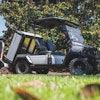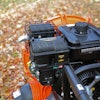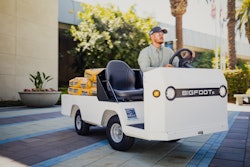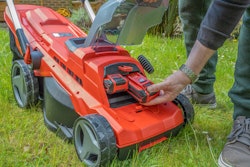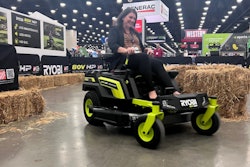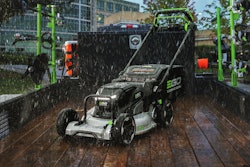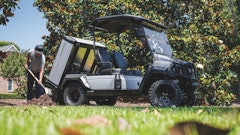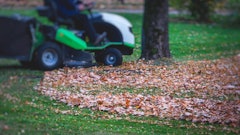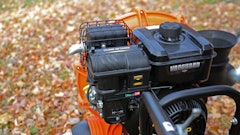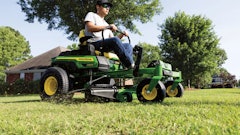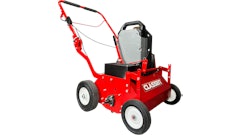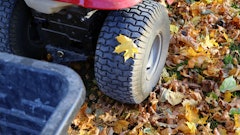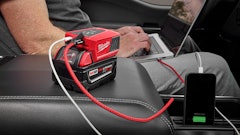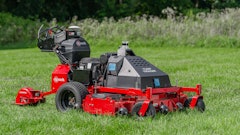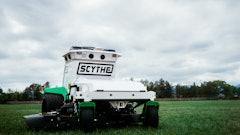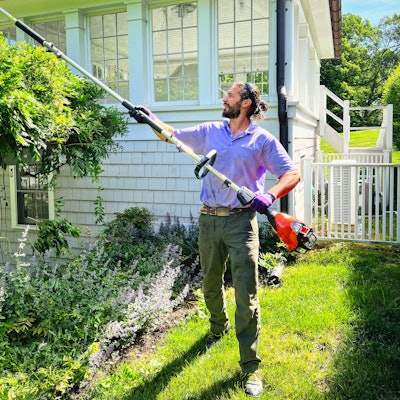
The buzz around electrification and battery-powered equipment has become louder and louder the past several years.
With increasing regulations in some regions and demands from customers for quieter equipment, some landscape companies have decided to seize the opportunity.
 Battery-powered equipment produces no emissions, less noise and less vibration, resulting in less fatigue for the operator.J&J Property Pros
Battery-powered equipment produces no emissions, less noise and less vibration, resulting in less fatigue for the operator.J&J Property Pros
“It may appear that our job is just to make tall grass shorter, but our real goal is to create meaningful environments for our customers, and this is all part of that,” says Tom Smith, division fleet manager for the West Division of LandCare, which has implemented 100 small pieces of Husqvarna equipment, such as string trimmers heads, chainsaws and backpack blowers, and is in the process of piloting battery-powered mowers and electric vehicles. “We realized the benefit of battery power to future generations and strongly believe that it's the right thing to do. At the same time, it was also a business decision because we could see upcoming regulations and discussions happening in local governments and wanted to be ahead of the curve in adopting the technology needed to meet those changes.”
Landscape contractors using battery-powered equipment in their day-to-day operations shed light on how they’re using the equipment and offer up advice for other landscape pros who have not yet powered down their gas-fueled equipment.
Why switch?
While some landscape companies soon may be forced into using battery-powered equipment due to regulations, others first started using it out of curiosity for the new technology.
“I wanted to see how long it would last and if it would work for a company like mine rather than just a homeowner using it on their own yard,” says Justin Burns, owner of Dependable Lawn and Garden Services in Livermore, Calif. “I wasn’t sure what to expect. I know a lot of people expect the battery life to not last very long, but I was surprised by how well it worked, and I started liking it more than my other equipment. Before I knew it, I was hanging up some of my original gear and heading out with the battery equipment.”
Burns, who uses Milwaukee Tool battery-powered equipment, started out using the string trimmer and hedge trimmer and now has a fully electric setup. The only items he sometimes supplements with gas power are backpack blowers in the fall when he’s cleaning up heavy wet debris.
Burns added that once he did the calculations of what he spent per year on oil and gas, the upfront cost of the battery and ultimate savings just made sense.
 Quieter operation means landscape pros can start mowing earlier in the morning and later in the evening.Blades of Grass Lawn Care
Quieter operation means landscape pros can start mowing earlier in the morning and later in the evening.Blades of Grass Lawn Care
“Buying all the batteries was basically like investing in all the gas upfront for the year, but then, in the years after that, they basically already paid themselves off,” Burns says. “So say I spent $2,000 on batteries, and I spent $1,200 on gas for the year, it all equals out within the year, especially when you’re talking about the cost of air filters, fuel filters, spark plugs and all that type of stuff.”
Other companies, like J&J Property Pros in Dutchess County, N.Y., took the leap toward battery solutions due to customer requests.
“We had a customer who said, ‘Hey, we want you to just use battery-powered equipment on our property,’” says Jenneka Temkin, co-owner of J&J Property Pros. “So we had certain projects where we used battery equipment, and from there, the rest is history.”
Being the first landscape company in the area to adopt the new technology proved to be another incentive, Temkin says.
“There are many skeptics, and we were at first as well, but we’re finding that it’s more efficient for our environment, and customers like it,” Temkin says. “It’s amazing how far battery products have come because if this was four years ago, I don’t think we would have been able to launch and go full into battery power."
LandCare has also experienced more loyalty from its clients due to its use of battery power.
“We learned we had more customers than we realized who wanted to be part of leading the charge to make a better environment,” Smith says. “Our employees have embraced it more than we thought they would, too. They've told us they feel good about doing what's good for the environment, but they also like the benefits that come with battery products like not having to pull start a gas machine on a cold morning or listen to the loud noise of a gas engine for hours and hours. We've heard from employees that they've found battery tools to be ergonomically beneficial, too. They enjoy working with the batteries on their backs and a lighter tool in their hands.”
Burns agrees.
“The gas equipment is very loud, there’s a lot of vibration and the exhaust just spits out right in your face,” Burns says. “I’ve had a lot of jobs where I’m using a gas-powered hedge trimmer for three hours and my arms feel like they’re vibrating for hours after.”
Burns adds battery equipment nearly eliminates the time and energy spent on maintenance of gas-powered equipment.
“I would always do maintenance on my own stuff, where I’d have to go down to my local shop, get spark plugs and fuel filters,” Burns says. “With the battery equipment, I can’t think of anything I’ve had to do maintenance wise except maybe put a little grease on the trimmer head and make sure the batteries are charged.”
Johny Crooks, owners of Blades of Grass Lawn Care in Savannah, Ga., adds that using battery-powered tools helps him get to customers’ properties sooner. He uses handheld battery-powered tools that use Toro batteries and the Revolution Mower, which allows him to mow 65 properties on one charge.
“We can start mowing with our push mowers earlier than before, and we have no issues with people complaining,” Crooks says. “I’ve had customers come out and say, ‘Whoa, I didn't even know that you guys were out here. It’s so quiet.’ And then they’re inquisitive about how it works.”
What to keep in mind
One potential obstacle to onboarding battery-powered equipment revolves around the infrastructure to support it.
To get around this and keep their operations running smoothly, landscape companies have come up with various solutions.
 Before making the move to battery-powered equipment, landscape pros can adopt a couple of pieces of equipment to see if they like them.Blades of Grass Lawn Care
Before making the move to battery-powered equipment, landscape pros can adopt a couple of pieces of equipment to see if they like them.Blades of Grass Lawn Care
Other landscape firms such as J&J Property Pros have employed trucks with electrical outlets and solar panels.
“We typically try to have all the batteries charged the night before, but all of trucks come with electrical outlets in the back or inside the vehicle just in case, and we have battery packs that we can just plug the batteries in to recharge them,” Temkin says. “We bring extra batteries just have on hand.”
She adds that the company has gas-powered equipment on hand as backup, but it mostly comes down to planning ahead.
“We typically plan a day in advance, so we know what we're doing that week. We just try to be proactive about charging the night before, and then you don't really have to worry about too much charging on the go,” Temkin says. “It also depends on what works best for your team and your workflow.”
Blades of Grass Lawn Care, being located in sunny Savannah, also makes use of solar panels on its trucks to recharge equipment.
“We bought a solar panel inverter to put into the trucks, and it was really good to keep ups charged up,” Crooks says.
Crooks adds that crews may need additional training to use the battery equipment to get over the learning curve.
“It’s learning how to feather the trigger, for example, with battery equipment because with gas, you just squeeze the trigger and go full bore,” Crooks says. “It’s also remembering that we’re so accustomed to hearing that loud noise with equipment that you’re under the impression that battery-powered equipment is not working the way it’s supposed to.”
When it comes to recycling the batteries at the end of their lifespan, Crooks recommends checking with municipal recycling centers in the area.
Advice from the pros
Landscape pros recommend doing due diligence in exploring the products versus jumping in blindly.
“It’s doing the research and not making any decisions in haste,” Temkin says. “For us, it was a process to sit down and think about whether this was the right decision. So, don’t rush into it. Think about your business as a whole and make strategic decisions from there.”
LandCare did just that.
“Before we converted to electric with our crews, we took extra effort to measure what they were doing with gas. We deployed hour meters on the equipment, and we tracked usage on a daily basis for several months,” Smith says. “This helped us understand what the real-life usage was for our gas equipment. We wanted to know things like how many hours a day the equipment was running, what the peak day for usage was because we wanted to make sure that when we converted to electric, we could have full buy-in from the employees. We knew if we sent them out there without enough battery power, it wouldn't be a good experience. We made sure we had enough batteries because it's not as easy as carrying around a gas can and filling up during the day.”
Burns suggests that once landscapers pick a platform and brand, they stick with it.
“You don’t want to have to invest a lot of money into different companies’ batteries and tools and mix and match stuff,” Burns says.
For landscapers still hesitant to include battery-powered equipment in their operation, Burns encourages them to not be afraid to try it.
“If you look at comments on social media, there’s a lot of people that are just gung-ho on gas, but a lot of these guys try it and come to say ‘Wow, this thing actually works,’ and then they put it on their trailer and use it every day,” Burns says. “I do see a lot of people moving toward battery equipment, even if they are on bigger equipment like ride-on mowers.”


